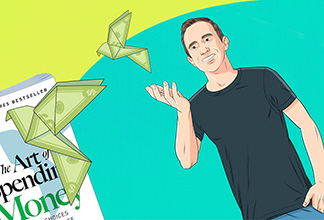How Stock Market Stress Could be Impacting Your Decision Making
Written by The Inspired Investor Team
Published on May 1, 2025
minute read
Share:
U.S. President Donald Trump’s on-and-off global tariff threats have kept markets and investors on edge for the past few weeks.
After tariffs were announced, U.S. stocks suffered the worst trading day since the start of the COVID pandemic on April 3.1 Then, when the president announced on April 9 that tariffs would be paused, the market rocketed back up, experiencing one of the best trading days since 1940, and the best one since 2008.2 The uncertainty is, understandably, making many people stressed and anxious, and leaving investors wondering what to do.
The irony, however, is that the worst time to make big decisions is often when you’re feeling stressed. “We're more likely to make reflexive decisions under stress, because we don't feel like we have the time to think it through,” says Dr. Jaideep Bains, senior scientist and director of UHN's Krembil Research Institute in Toronto. We asked Bains about how your brain processes the stress of market swings – and what that means for your investing decisions.
This is your brain on stress
The reason we lack practical decision-making skills when we’re anxious is biological. “When we experience stress, our brain shifts into a survival mode and that activates different circuits, which are designed to protect us, whether that's through changes in our behavior or reallocation of our metabolic resources,” says Dr. Bains.
Under normal circumstances, the top part of the brain, called the cortex, makes the decisions that guide us through life. It’s the part of the brain which is most highly evolved and which gives us access to information and memory. But when we experience a stressful situation, we can’t tap into all that. Instead, the area of the brain that’s responsible for emotions, the amygdala, sends signals to the hypothalamus and brainstem, the parts that’re in control of automatic functions like breathing and heartrate. These areas then tell the rest of the body to go into fight-or-flight mode, which overrides our ability to be rational. This isn’t ideal for investors who need to make decisions about their holdings. If you’re feeling under pressure, you could end up making irrational decisions about your portfolio, like selling out stocks that still have strong fundamentals and long-term potential.
The negative effect of fear
Stress can also alter our perception of a situation, making us interpret it more pessimistically. “For any organism, not just humans, when the outcome is unknown, you’re often biased towards an outcome that is negative,” says Dr. Bains. The reason, he explains, is that a negative outcome could be life threatening. “Your brain is designed to protect you from danger, and that means you can't really make a rational decision in a stressful situation, like when markets are turbulent, because a lot of your energy and thought processes are going towards something dangerous that may occur.”
When your thoughts are skewing negative, you may be more likely to give in to something called recency bias, which is when you place more importance on something that just happened or whatever is top of mind. For example, if all you’re reading about is negative market news and the impact of tariffs, you may feel like you need to act immediately on that information. The facts, though, may tell a different story.
See ya, impulse control!
Because our brains perceive a stressful situation as potentially life threatening, they want to find the quickest way to safety. In that state, you can be impulsive and make decisions to give yourself a sense of comfort and control. “These decisions are very narrow minded. You're likely going to have tunnel vision. You're likely going to be less creative. You're not going to be great at-risk analysis,” says Marc Whitehouse, a registered social worker and executive coach with Whitehouse Counselling Services.
While it may be tempting to make a decision simply to feel the comfort of being in control, pausing and waiting, despite the discomfort of the unknown, is often the wiser move. To quell your anxiety, take action by reviewing your plan. Pay attention to any company metrics you follow on a regular basis to see if your investment thesis has changed. Above all else, stay calm and approach your portfolio with a level head.
Can you make good decisions under stress?
You can, says Bains, with a caveat: you need to be highly trained to do it. Think of first responders or military personnel – they’ve spent years honing their ability to make good choices under stress. In fact, a little bit of stress for these folks can be a positive thing. “It sharpens your senses and makes your physical responses a little bit better and a little bit quicker,” he explains. But for most of us, the current market volatility is a unique situation. So, while a portfolio manager or a financial advisor may have the expertise to navigate tough choices in these stressful times, a less experienced investor may be more likely to make poor decisions.
Take a breath
While it’s tough to think rationally during times of stress, your best bet is to take a beat rather than doing somethings rash. “Try to create a little bit of a delay before making a decision,” says Whitehouse. “It doesn't have to be a huge one, but if there is no life-and-death urgency, create a strategic pause.” Take some time to review your long-term financial plan to help keep you focused on your goals. You’ll also want to put down your phone to avoid mainlining anxiety-provoking news about market fluctuations. Many of Whitehouse’s executive clients rely on a support network of people they can bounce ideas off to gain a different perspective – you may want to reach out to a financial professional if you need to ask questions to clarify your position.
If you ask Dr. Bains his thoughts on making decisions under stress, he’ll say, if possible, just don’t do it. Though he acknowledges that can be easier said than done. “You can rationalize it all you want, but when your body is in survival mode, it’s tough.”
Sources
1. CBC, "RECAP | U.S. stock market sees worst day since 2020 as Trump's trade war rattles global economy", April 3, 2025
2. PBS News, "U.S. stocks shoot to historic gains after Trump pauses most of his tariffs", April 9, 2025
RBC Direct Investing Inc. and Royal Bank of Canada are separate corporate entities which are affiliated. RBC Direct Investing Inc. is a wholly owned subsidiary of Royal Bank of Canada and is a Member of the Canadian Investment Regulatory Organization and the Canadian Investor Protection Fund. Royal Bank of Canada and certain of its issuers are related to RBC Direct Investing Inc. RBC Direct Investing Inc. does not provide investment advice or recommendations regarding the purchase or sale of any securities. Investors are responsible for their own investment decisions. RBC Direct Investing is a business name used by RBC Direct Investing Inc. ® / ™ Trademark(s) of Royal Bank of Canada. RBC and Royal Bank are registered trademarks of Royal Bank of Canada. Used under licence.
© Royal Bank of Canada 2025.
Any information, opinions or views provided in this document, including hyperlinks to the RBC Direct Investing Inc. website or the websites of its affiliates or third parties, are for your general information only, and are not intended to provide legal, investment, financial, accounting, tax or other professional advice. While information presented is believed to be factual and current, its accuracy is not guaranteed and it should not be regarded as a complete analysis of the subjects discussed. All expressions of opinion reflect the judgment of the author(s) as of the date of publication and are subject to change. No endorsement of any third parties or their advice, opinions, information, products or services is expressly given or implied by RBC Direct Investing Inc. or its affiliates. You should consult with your advisor before taking any action based upon the information contained in this document.
Furthermore, the products, services and securities referred to in this publication are only available in Canada and other jurisdictions where they may be legally offered for sale. Information available on the RBC Direct Investing website is intended for access by residents of Canada only, and should not be accessed from any jurisdiction outside Canada.
Explore More

What Investors Should Know About the Precious Metals Market
Factors influencing silver, platinum and palladium
minute read

The Art of Spending: 5 Takeaways from Morgan Housel’s New Book
Ideas for how to build a healthier relationship with money and how you spend it
minute read

Should I Invest or Pay Down My Mortgage?
Consider these four questions
minute read
Inspired Investor brings you personal stories, timely information and expert insights to empower your investment decisions. Visit About Us to find out more.







